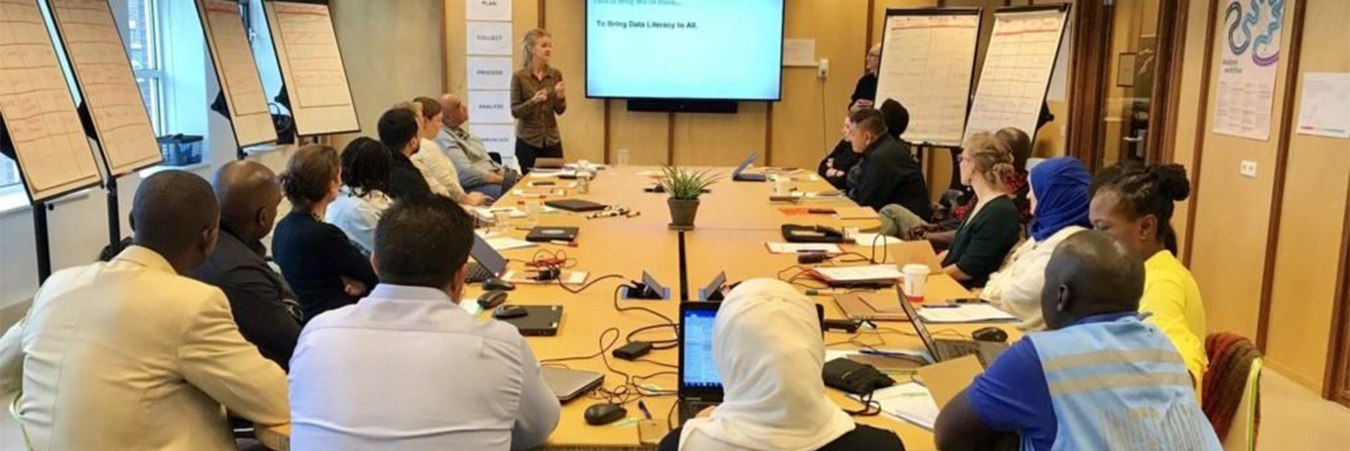How to Build Data Literacy at the UN: Lessons from OCHA



23 December 2019
By Katelyn Rogers and Lisa Peterson, Data Literacy Co-Lead, Centre for Humanitarian Data, United Nations Office for the Coordination of Humanitarian Affairs
There has been a rapid and significant shift in the role data plays in all of our work, with virtually every aspect shaped by data. Everyone in the United Nations community is working with and using data in some capacity.
However, while data is ubiquitous, data skills are not. Within the UN, data is often seen as the work of data managers and ICT specialists. The UNOCHA Centre for Humanitarian Data, through its Data Literacy focus, has been working to ensure that all humanitarians see themselves as playing an essential role in the responsible, effective and efficient management of data.
Data Literacy Survey Results
In early 2019, the Centre conducted design research to better understand data literacy needs within OCHA and the humanitarian sector at large. The research showed that while all humanitarians are working with data, data skills remain underdeveloped outside of technical functions. The lack of data skills and knowledge of data processes affects collaboration and hampers the ability of substantive experts to work effectively with technical experts.
In fact, what we have observed is that organizations across industries are seeing the value of investing in data literacy and there has been a sharp rise in initiatives to upskill non-technical teams in both the public and private sectors.
What Is Data Literacy?
Before we started developing a programme to build data skills, we established a functional definition of data literacy to serve as a vision of what we were trying to achieve. Our definition, revised from an MIT publication entitled Designing Tools and Activities for Data Literacy Learners, encompasses the ability to read, work with, analyze, and converse with data. Data literacy is more than knowing a programming language, or a mastery of spreadsheets. It will look different for everyone.
Senior managers, for example, need to understand and engage with data in order to draw conclusions, communicate insights and make decisions. For them, data literacy means understanding data concepts and analysis and being able to confidently drive data processes.
Our Data Literacy Foundation Programme and Next Steps
Humanitarian Affairs Officers (HAOs) represent a vast segment of non-technical staff in OCHA and are vital in shaping and driving data processes. At the end of December, we will conclude our first Data Literacy Foundation Programme for HAOs. The three-month intensive training included a weeklong, in-person data bootcamp, online learning and hands-on mentorship. It sought to improve the ability of HAOs to read, work with, analyze, and converse with data. Participants gained an understanding of their role in the data management process vis-a-vis their colleagues, counterparts and senior managers. They also improved their ability to apply data skills in the workplace.
Participants developed a greater understanding of a broad range of data concepts and will be able to continue to develop their data skills independently. During the course, we covered the following:
- Asking questions and planning for data processes
- The art and science of cleaning data
- Demystifying analysis
- Keeping it simple with visualizations
As we wrap up our first cohort with the data literacy programme, we are looking to expand to new areas. We would like to target other non-technical staff, from communications officers, to sector-specific organizations operating on the frontlines of data. With functional data literacy as our goal, we want to match the use of data with the appropriate skills to engage with it.
Data Literacy in the wider UN context
The UN Secretariat is developing a growing interest in facilitating a more coordinated and effective data ecosystem at the UN. As demonstrated by this piece, we in OCHA believe that a key requirement for creating such a data ecosystem is a commitment to a Data Literacy programme that can upskill and empower the entire workforce. While our focus here has been on the humanitarian context, some of our thinking and lessons learned around Data Literacy may also be of value to the wider UN community. We wholeheartedly agree with OICT’s view that the UN needs a multi-disciplinary and collaborative approach when speaking about data and OCHA stands ready to collaborate with colleagues across the organization to help create more value with data, including through the critical pillar of data literacy.
*The views expressed herein are those of the author(s) and do not necessarily reflect the views of the United Nations.
| Tweet |

